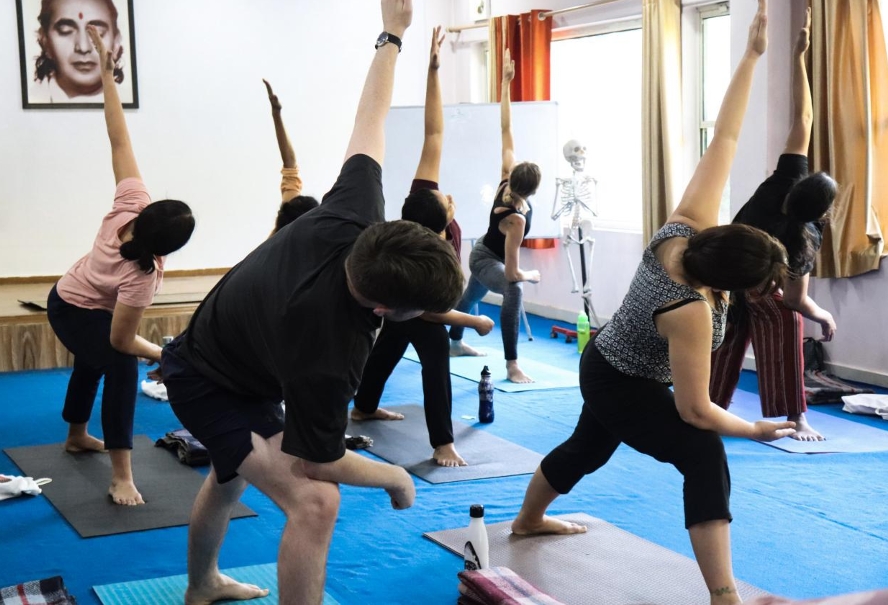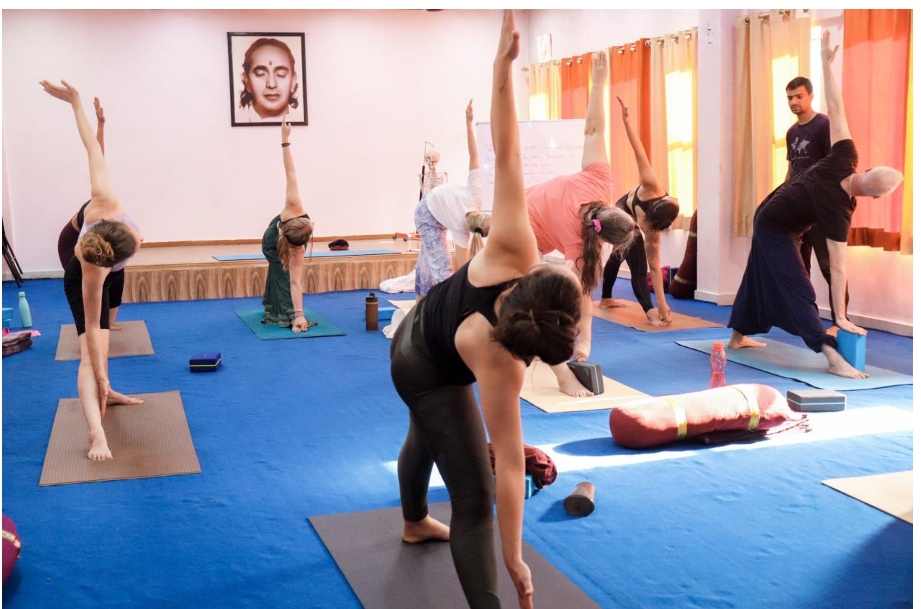Introduction
Yoga courses come in various forms and cater to different levels of experience and interests. Here are some common types of yoga courses you might find:
Beginner Yoga Courses:
These yoga courses are basically short duration of typically 1-3 weeks or a bit more. These focus on the introduction to basic yoga postures (asanas), breathing techniques (pranayama), and relaxation methods. These are suitable for individuals new to yoga or those looking to refresh, or revisit the basics.
Intermediate Yoga Courses:
These types of courses are longer duration of typically 4-8 weeks, or a bit more. These focus on more advanced asanas, deeper exploration of pranayama, and introduction to meditation practices, practical parts of yoga philosophy. These are suitable for those with some yoga experience looking to deepen their practice.
Advanced Yoga Courses:
These types of courses are long term or sometimes lifelong commitment to practice. Therefore, the time varies and courses can be ongoing. These focus on more complex postures, advanced breathing techniques, meditation, and insights into yoga philosophy. These are usually suitable for the experienced practitioners seeking to master their practice and live a life of yogi.
Yoga Teacher Training (YTT):
These have certain duration of 200-hour, 300-hour, or 500-hour courses. These can comprise the above three categories as well. They focus on providing comprehensive training including asanas, pranayama, meditation, anatomy, teaching methodology, and philosophy. Such training are suitable for individuals aiming to become certified yoga teachers or deepen their knowledge significantly. For such trainings one often looks for the best yoga teacher training in Rishikesh which are worldwide famous because Rishikesh is the “Capital City of Yoga”. In such courses a 200 hour Yoga Teacher Training in Rishikesh would be good choice to start with.
Specialized Yoga Courses:
There are some specialized yoga courses, such as Prenatal Yoga, Kids Yoga, Senior Yoga, Yoga Therapy, etc. They mainly focus on tailored to specific populations or health conditions. They can be suitable for practitioners with particular needs or interests, or those looking to teach these specific groups.
Intensive Yoga Retreats:
There are some intensive yoga retreats which can have a typical duration of 1-2 weeks. They usually focus on intensive practice in a retreat setting, often including multiple daily yoga sessions, meditation, and workshops. They are suitable for those looking for a deep, immersive experience.
Online Yoga Courses:
Such courses are of various duration. These focus on flexible learning from home, covering various aspects of yoga practice. They are suitable for individuals needing flexible scheduling or remote access.
Workshops and Seminars:
Workshops are usually 1 day to 1 week long courses. They are intensive too in nature. They focus on specific topics such as yoga anatomy, yoga for stress relief, advanced poses, or yoga philosophy. They can be suitable for practitioners wanting to focus on a particular aspect of yoga.
Corporate Yoga Programs:
The duration of corporate yoga programs are also vary. They focus yoga sessions designed for workplace wellness, stress management, and team building. They are suitable for companies and their employees.
Personalized Yoga Programs:
Duration of personalized yoga courses are customized. They focus on tailored to individual needs, goals, and health conditions. They are suitable for those seeking one-on-one instruction and a customized practice plan.
Having mentioned the above categories, we would love to provide the following key considerations when choosing a Yoga Course. You can first define what you want to achieve (e.g., physical fitness, stress relief, teaching certification). Then choose a course that matches your level of experience. It is important to check the instructor qualifications as well. Therefore, look for experienced and certified instructors. Also check which style of Yoga you are interested in. So, identify the style of yoga that resonates with you. Further you can check your duration and commitment to learning. Please ensure the course fits your schedule and commitment level. Then decide if you prefer in-person classes, retreats, or online learning. Considering your budget is also an important thing to do. The cost of the course and any additional expenses (travel, accommodation for retreats, etc.).

Yoga can be practiced in various locations, each offering unique benefits and experiences, for example, Yoga Studios, Fitness Centers/Gyms, Retreat Centers, Outdoor Locations, Community Centers, Home Practice, Schools and Universities, Corporate Offices, Hospitals and Healthcare Facilities, Retirement Homes/Senior Centers, Spiritual Centers/Ashrams, Hotels and Resorts, Online Platforms. Each location offers unique advantages, and the best choice depends on your personal preferences, lifestyle, and yoga goals.
Here we will focus on one of the very effective learning experiences which is residential learning in the heart of the yogic community. Residential yoga courses in Rishikesh offer numerous benefits due to the unique combination of the region’s spiritual heritage, natural beauty, and dedicated yoga instruction. Here are some of the key advantages:
Authentic Yoga Experience:
Rishikesh is often referred to as the “Yoga Capital of the World.” The town’s longstanding tradition of yoga and meditation offers an authentic experience guided by knowledgeable instructors who often have deep roots in traditional practices.
Immersive Learning Environment:
Residential courses provide an immersive environment, allowing students to fully engage with their practice without the distractions of daily life. This intensive focus can lead to more profound personal and spiritual growth.
Serene Natural Setting:
Situated along the banks of the Ganges River and surrounded by the Himalayan foothills, Rishikesh offers a serene and picturesque setting. The natural beauty and tranquility of the area enhance the overall yoga experience, promoting relaxation and inner peace.
Community and Connection:
Living with fellow students creates a sense of community and support. This communal living environment fosters connections, allowing for shared learning experiences and mutual encouragement.
Access to Experienced Teachers:
Many residential courses in Rishikesh are led by highly experienced and revered yoga teachers. These instructors often have extensive knowledge of various yoga styles and philosophies, providing students with high-quality instruction.
Holistic Approach:
Residential yoga programs often include a comprehensive approach to well-being, incorporating not just asana (physical postures) but also pranayama (breathing exercises), meditation, chanting, philosophy, and Ayurvedic principles. This holistic approach nurtures both body and mind.
Spiritual Atmosphere:
Rishikesh is a spiritual hub, attracting seekers from around the world. The town is filled with temples, ashrams, and spiritual centers, offering numerous opportunities for spiritual enrichment and exploration.
Detox and Rejuvenation:
The structured schedule of a residential course, combined with healthy vegetarian meals and regular practice, can lead to physical detoxification and rejuvenation. Many programs emphasize a sattvic diet, which is believed to promote clarity and vitality.
Personal Transformation:
Intensive and immersive courses can lead to significant personal transformation. The combination of disciplined practice, spiritual teachings, and self-reflection often helps individuals overcome personal challenges and develop a deeper understanding of themselves.
Certification and Career Opportunities:
Many residential courses in Rishikesh are Yoga Alliance certified, providing internationally recognized certification. This can open up career opportunities for those interested in teaching yoga professionally.
Cultural Enrichment:
Living in Rishikesh offers a chance to experience Indian culture firsthand. This includes participating in local festivals, visiting ancient temples, and interacting with locals, all of which enrich the overall experience.
Access to Diverse Yoga Styles:
Rishikesh hosts a variety of yoga schools offering different styles of yoga, from traditional Hatha and Ashtanga to more contemporary forms like Vinyasa and Yin yoga. This diversity allows students to explore and find the style that best suits their needs and interests.
Therefore, we can conclude that the residential yoga courses in the yoga capital Rishikesh can provide a wholesome experience and offer numerous benefits due to the unique combination of the region’s spiritual heritage, natural beauty, and dedicated yoga instruction.







